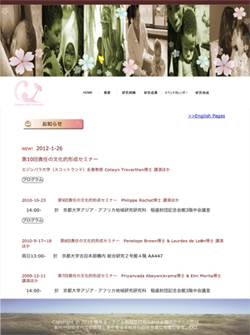要旨:第2回 国際シンポジウム Microethnography of Child Care across Cultures(2008・3・24開催)
1. Akira Takada (Kyoto Univ.)
Underlining pragmatic constraints: Sequential organization of “imitation” activity among the San of the Central Kalahari
Research on the development of social interaction has contended that using imitation effectively is the most important trait allowing humans to learn about historically formed culture (Tomasello 1999). What is less emphasized, however, is that imitation activity is structured by the sequential organization of interactions embedded in the participation framework of a given speech community. Using videotaped interactions among San children, who live in a post-foraging society in southern Africa, I investigate the development of communicative competence in their imitation activity. Young San children aged one to three do not use words frequently in their daily lives, even when old enough to understand their language. Instead, they often participate in multimodal communication, especially dancing. Their dance performances consist of a rhythmic organization of interactions among a multi-aged group of children. For example, they keep clapping their hands while forming a circle and each child takes a turn to perform a dance step at the center. To participate, the San children need to imitate the actions of others, such as clapping and stepping at appropriate points in the course of interaction. These actions embody the culturally formed pattern of dancing. Once habituated to the pattern, they can improvise their own performances. Therefore, dance performances amplify their reflexive consciousness not only of actual actions but also of potential actions deduced from the culturally formed pattern (Hanks 1996). This gives San children a foundation for developing the interactive aspects of communicative competence, namely competence to negotiate the meaning of actions with others.
2. Tomoyo Takagi (Tsukuba Univ.)
Language Socialization through Turn and Sequence:
“Japanese communicative style” revisited
This presentation is intended to show how conversation analytic approach to language socialization will allow us to locate the features of turns and sequences that embody socialization as they are being constructed in moments of real-life social activities, that is, everyday interaction between children and their caregivers. CA shares with language socialization research its interest in details of child discourse in natural settings and belief that exposure to and participation in everyday language activities with other members of society is a primary medium of socialization. CA methodology can provide a powerful tool for explicating concrete features of interactional competence that young children demonstrate by participating in interactions with their care-givers or peers. In particular, I will focus on instances from Japanese child-adult interactions in which the child’s ‘innocent’ utterance creates some kind of conflict or bewilderment on the part of the adult participant(s). The ways in which the adult participants treat such utterances might be taken as instantiating such characters of Japanese “indirect” and “evasive” verbal communication. I will try to recapture what has been thought of as characters of Japanese communicative style from interactional perspective in order to reveal how such characters are organized in publicly recognizable ways. Rather than trying to deal with the question of whether those characters do or do not constitute part of the culture-specific communicative style, I will attempt to illustrate the ways in which they are collaboratively (i.e. by both adults and children) embodied through intricate interactional practices. I hope to show that the main concern of language socialization research, ‘cultural’ aspects of the process in which persons become competent members of social groups through language learning are locally ordered and interactionally achieved to deal with the immediate interactional exigencies in real-life projects.
Leah Wingard (San Francisco State Univ.)
Socializing Children to Practices and Ideologies of Work through Talk about Homework
Completing assigned homework from school is one of the ways in which American middle class children come to be socialized into the norms, practices and cultural ideologies of work. When children come home from school, their parents often engage them in talk that plans for and mobilizes homework start. In this presentation, I document some of the discursive practices used in talk about homework in 32 middle class families who were videotaped during the course of everyday life. Using language socialization as a unifying framework, I examine this talk for the ways in which parents frame homework as work as they topicalize homework early in the day after school and encourage their children to prioritize homework over other activities and complete homework in a timely fashion. In the presentation I discuss what I call the first mention of homework. In the recorded data, parents overwhelmingly mention homework first and this topicalization clears the way for further talk in which homework is planned into the afternoon and evening. Additionally, I examine talk in which parents and children construct time for homework and other activities. Specifically I document how activities are appended and prepended as a technique to manage time and activities so that homework is explicitly planned into the day and prioritized. Finally, I discuss the propositional content of accounts that parents use in conjunction with directives to start homework. I am interested in the ways that these accounts provide reasons and ideological framing for why homework should be started. The accounts used by parents also strongly orient to notions of time management and further document how homework is oriented to as an activity that needs to be prioritized and as an activity that the child needs to “get out of the way”.

